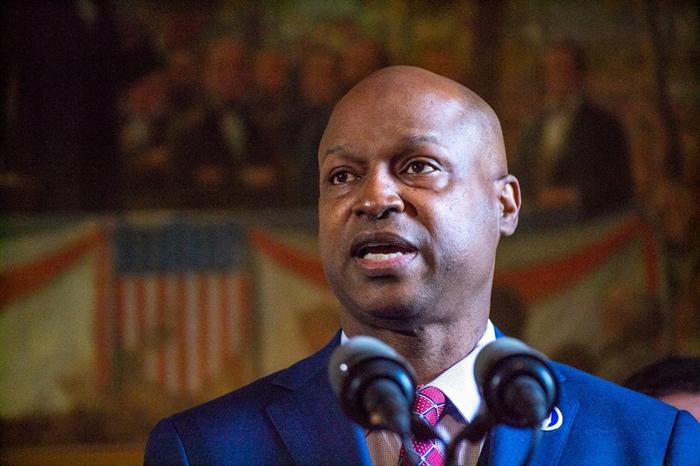SPRINGFIELD – Efforts to form a union by staff in House Speaker Emanuel “Chris” Welch’s office could provide an early and unexpected test of the new Workers’ Rights Amendment to the Illinois Constitution.
Brady Burden, a staffer in the speaker’s office who is part of the organizing committee of the Illinois Legislative Staff Association, said efforts to unionize have thus far been stymied by a provision in state law that specifically exempts the General Assembly from the Illinois Public Labor Relations Act.
But there is no such exemption in the Workers’ Rights Amendment, approved by voters less than a year ago. That addition to the state’s constitution provides, in part, that all employees have a “fundamental right” to organize and engage in collective bargaining over wages, hours and working conditions.
But at least one expert in Illinois labor law says relying on that amendment may be more difficult legally for the workers than it might first appear.
“Anytime this (constitutional amendment) is going to be litigated, if ever, it’s going to require some degree of interpretation. It just will because it’s just not clear,” said Michael LeRoy, a professor at the University of Illinois College of Law and the School of Labor and Employment Relations. “It’s not exactly clear what this means.”
According to Burden, efforts to form a union began last year but they did not go public with their campaign until May. He said well over half of the 38 employees who would be part of the bargaining unit – analysts, researchers and people who work with legislators – have signed a petition calling to form a union, which would be enough for automatic recognition by most other public employers.
Among the issues they’d like to negotiate, Burden said, are wages and hours. He said the starting salary for Democratic House staffers is around $43,000 annually, which he said is significantly lower than comparable jobs in the Senate or even for House Republican staff. He also said they would like better compensation for overtime.
Legislative staff jobs are exempt from wage and hour laws, so those workers do not receive the standard time-and-a-half when they work more than 40 hours in a week – which they do routinely during legislative sessions. Instead, Burden said, they receive roughly one hour of comp time for every three hours of overtime they work.
But because current law specifically exempts the General Assembly from the definition of a “public employer,” Burden said they are asking Welch to recognize their union voluntarily.
Welch’s office, however, has said he prefers they hold an election because recognizing the union voluntarily would deny staff the chance to weigh in on which organization they’d like to represent them.
Burden said that can’t be done because of the exemption in current state law, leaving them with the options of voluntary recognition or a lawsuit.
“It’s in the Constitution. We have a right to organize,” Burden said. “The only issue that we need, is that the speaker recognize the union.”
LeRoy, however, said the Worker’s Rights Amendment is actually vague on that issue because it’s written in prospective terms, referring to future enactments by the state or local governments.
He said that although the first sentence of the amendment says employees have a fundamental right to organize, the next sentence says, “No law shall be passed that interferes with, negates, or diminishes” collective bargaining rights.
“They use the term ‘shall be.’ That’s future tense,” he said. “It doesn’t reach back. It doesn’t say any law that has been enacted that interferes with collective bargaining is hereby nullified. It doesn’t say that.”
LeRoy said the purpose of the amendment was to prevent the enactment of so-called “right-to-work” laws at either the state or local level. Those are laws that say employers cannot require someone to be a member of a union as a condition of employment.
“This constitutional amendment really grew out of the experience with (former Republican) Gov. Bruce Rauner, who really wanted to make Illinois a right-to-work state,” he said. “That was a Democratic reaction to, or response to, (Rauner).”
LeRoy said that from a legal standpoint, he believes the Workers’ Rights Amendment is not a convincing argument for those trying to form a union. But he added, “Politically, it is very convincing.”
“I mean, in effect, this is really calling out the Democratic-controlled General Assembly as a group of hypocrites,” he said. “You’re legislating for thee, not me. And I think in the court of public opinion, that’s where this battle can be waged with a better chance of success.”

